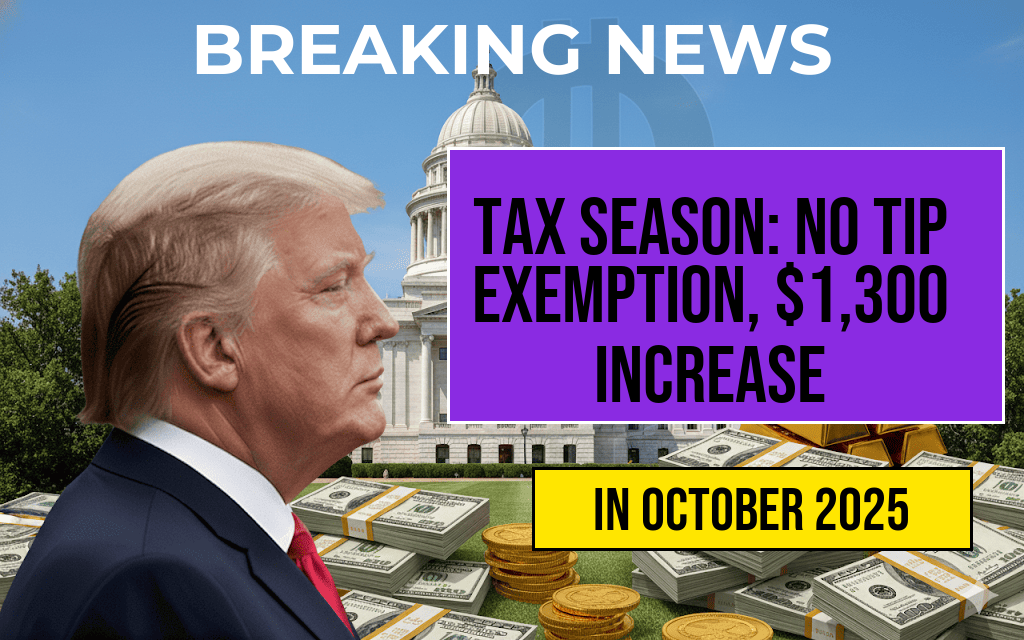Taxpayers who rely on tips for their income may soon find relief, as recent legislative changes have effectively eliminated the federal **tax on tips**. This shift could open a pathway for workers such as **golf caddies**, **DJs**, and others earning supplemental income through gratuities to retain more of their earnings. Additionally, the removal of the tip tax paves the way for a potential **$25,000 deduction** that could benefit a wide array of service workers and performers, helping them offset expenses associated with their craft. The move signals a significant adjustment in how tip income is taxed, aiming to reduce the administrative burden on workers and improve their net income. Experts suggest this change could reshape the landscape of tip reporting and help small-business owners in the service industry better manage their finances.
Legislative Changes and Their Impact on Tip Taxation
Background of the Tip Tax
The federal government has traditionally classified tips as taxable income, requiring workers to report gratuities to the IRS and pay applicable income taxes. This policy, established decades ago, aimed to ensure fair taxation across all income sources. However, critics argue that the system often creates compliance challenges for workers who receive irregular or unreported tips, especially those in informal settings or small businesses. The recent legislative shift aims to address these issues by modifying the tax treatment of tips, relieving some of the compliance burden on workers and employers alike.
Details of the New Legislation
The new law, enacted as part of broader tax reform measures, eliminates the federal **tip tax** for workers earning under a specific income threshold, currently set at $25,000 annually. This means that tips received below this threshold are now exempt from federal income tax, allowing workers to keep a larger portion of their gratuities. For those earning above this threshold, the law introduces a **$25,000 deduction** that can be used to offset tip income, effectively reducing the taxable amount. This approach aims to balance fairness with administrative simplicity, especially benefiting workers in roles where tips constitute a significant part of their compensation.
Who Benefits from the Change?
| Worker Type | Estimated Annual Tip Income | Benefit |
|---|---|---|
| Golf Caddies | $10,000–$20,000 | Tax exemption on tips, increased net earnings |
| Disc Jockeys (DJs) | $5,000–$15,000 | Eligible for the $25,000 deduction, lower tax burden |
| Food Service Workers | $15,000–$30,000 | Partial exemption, potential for significant savings |
| Event Staff & Performers | $3,000–$10,000 | Tax-free tips under threshold, easier reporting |
Implications for Small Business Owners and Service Industry Workers
Financial Relief and Simplified Reporting
By removing the federal tip tax for lower-income earners and providing a substantial deduction for higher earners, the legislation aims to streamline tax reporting and reduce compliance costs. For small business owners and independent contractors, this change could translate into more straightforward bookkeeping processes and increased take-home pay for employees. Furthermore, the **$25,000 deduction** might serve as a safety net for those whose tip income fluctuates or is difficult to document accurately, enabling better financial planning.
Potential for Broader Economic Effects
Economists suggest that easing tax burdens on tip income could incentivize more transparent reporting and reduce the underreporting of gratuities. As workers retain more of their earnings, consumer spending in the hospitality, entertainment, and service sectors may see a modest boost. Additionally, with less paperwork and fewer IRS audits related to tip income, both workers and employers could experience reduced administrative burdens, fostering a more efficient service economy.
Expert Perspectives and Future Outlook
Tax professionals emphasize that while the elimination of the tip tax offers immediate benefits, workers should remain aware of evolving reporting requirements. The legislation signals a shift toward a more flexible approach to tip taxation, aligning with broader efforts to simplify the tax code. According to experts at Forbes, this move could set a precedent for future reforms that further ease the tax burden on gig and service workers.
Resources for Workers and Employers
Frequently Asked Questions
What is the recent change regarding the tax on tips?
The recent update eliminates the tax on tips, providing a significant benefit to workers who earn gratuities.
How does the $25,000 deduction impact taxpayers who receive tips?
The $25,000 deduction can potentially cover various expenses such as golf caddies, DJs, and other service-related workers, reducing their taxable income.
Who can benefit from the elimination of the tip tax and the new deduction?
Workers who earn tips in industries like hospitality, entertainment, and service sectors could benefit, especially those whose tip income approaches or exceeds the $25,000 threshold.
Are there any specific requirements to qualify for the $25,000 deduction?
Eligibility typically depends on reporting tip income accurately and meeting certain IRS guidelines, ensuring that the deduction applies correctly to qualified tip earners.
How might this change affect service industry workers financially?
This change could lead to lower tax liabilities for many workers in the service industry, potentially increasing their take-home pay and making tips a more advantageous earning method.






